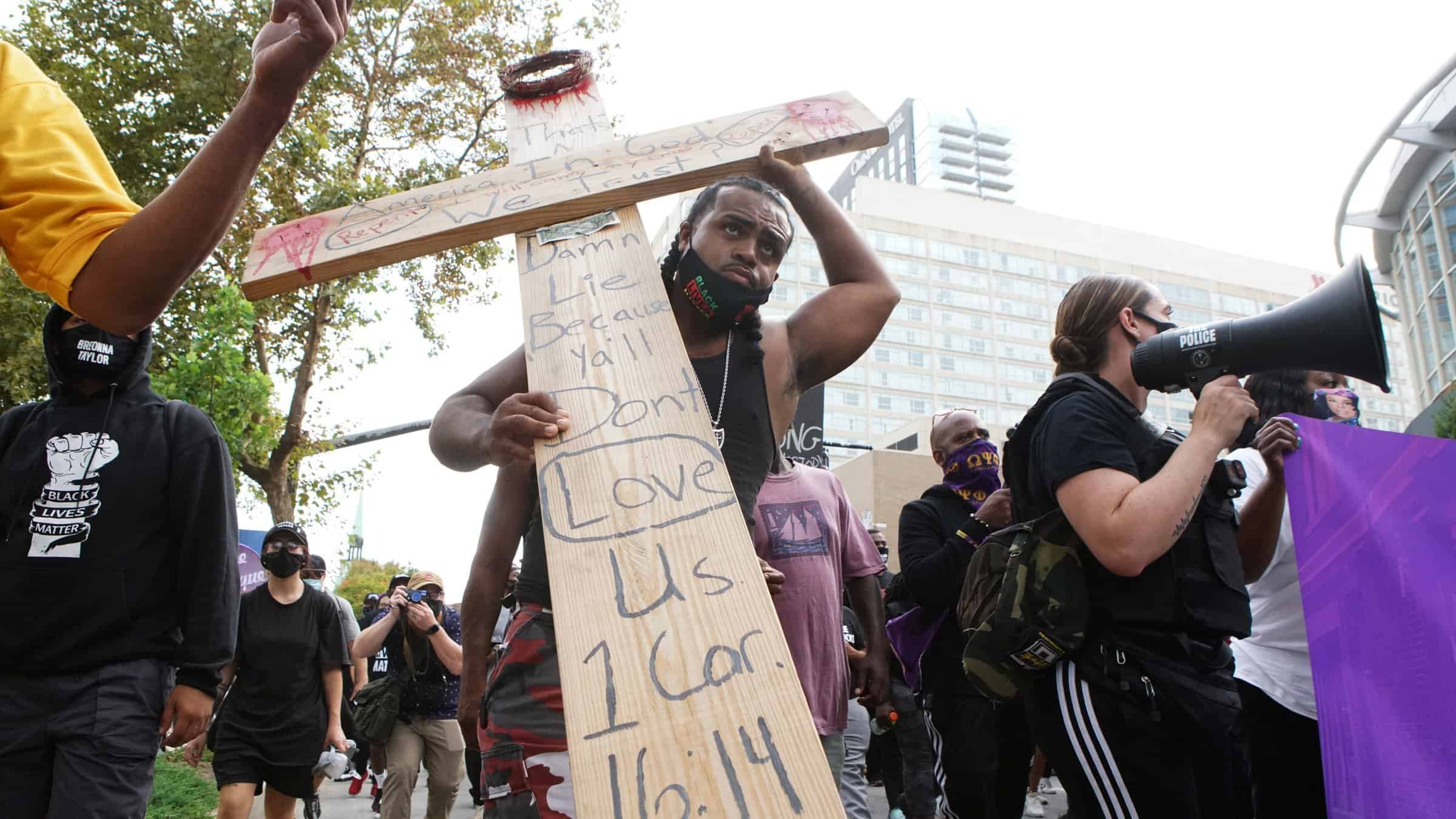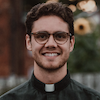Bishop Barron recently wrote about an abyss he sees between contemporary activists and religion. “One of the most remarkable differences between the social protests of the 1960’s and those of today is that the former were done in concert with, and often under the explicit leadership of, religious people,” he writes.
One reason for a supposed breakdown, he highlights, is that “a philosophical system more alien to religion than was classical liberalism has come to hold sway in revolutionary circles.”
He refers to protest movements broadly, but invokes Dr. King and, by his characterization, seems to have in mind differences between the Civil Rights Movement and contemporary racial justice movements. He has spoken on this before, holding King up as a model for how he thinks people should be striving for justice today.
The philosophical differences Bishop Barron points to may exist, but such a divide is more complex than just being between religious people and revolutionaries. The divide is more between religionists whom Dr. King referred to as the “white moderate” and antiracist activists, many of whom are religious. But that divide is not new.
More importantly, however, criticizing philosophical differences or a lack of religious rhetoric without giving adequate attention elsewhere to how the Church’s own racism has alienated people from religion is itself part of the problem.
It is true that much of the Civil Rights Movements of the 1960s was done in concert with religious leaders, but those leaders were mostly Black and their participation was motivated by their religion as well as a fight for their own freedom. The use of classical liberalism and religious rhetoric by Dr. King may be inspiring today for white Christians and seem like the most attractive way to speak about current issues, but it is wrong to believe that it was especially effective in garnering wide swaths of support from white religious people in the sixties.
In Dr. King’s 1963 Letter from a Birmingham Jail, which Bishop Barron invokes as the quintessential example of this melding between religion and protest, he wrote about the very abyss Bishop Barron says is new:
“In deep disappointment I have wept over the laxity of the church…How we have blemished and scarred that body through social neglect and through fear of being nonconformists.
If today’s church does not recapture the sacrificial spirit of the early church, it will lose its authenticity, forfeit the loyalty of millions, and be dismissed as an irrelevant social club with no meaning for the twentieth century. Every day I meet young people whose disappointment with the church has turned into outright disgust.”
Dr. King did not enjoy great success in converting white Christians to his cause. Five years after this letter, just before his assasination, he was considered an un-American agitator by nearly 75% of the country.
Bishop Barron writes, “The absence of religious leadership in the protest movements of the present moment, and indeed the hostility to religion exhibited by many of the protesters, are a function of a major shift in the culture.” Such a dynamic is hardly new.
In his 1852 speech, “What to the Slave is the Fourth of July?”, Frederick Douglass asserted, “The anti-slavery movement in this country will cease to be an anti-church movement when the church of this country shall assume a favorable, instead of a hostile position towards that movement.”
King and Douglass, both ordained Christian ministers, diagnosed an abyss between established religious leaders and their own movements not as philosophical differences but as a reticence by many white church leaders to engage their movements with a sincere sense of urgency. Or, as Dr. King put it, a “social neglect and fear of being nonconformists.”
Though contemporary antiracist movements may be less explicitly religious than Dr. King was, there are plenty of leaders in current movements who are religious.
Cori Bush, a leader in the 2014 Ferguson uprisings and a Black Lives Matter activist currently running for U.S. Congress, is an ordained Christian minister. The Poor People’s Campaign, a national mobilization of thousands of Americans that describes itself as a “national call for a moral revival” is led by Reverend William Barber II, who does not shy away from the biblical vision which inspires him.
These are just two examples, but indeed, many people transcend a supposed “intellectual abyss” between religion and activism today.
Characterizing the divide as one between protesters and religion, and not as one of protesters and a moderate white church, sidesteps the fact that many white religious leaders were actually hostile to Dr. King’s vision in the 1960s and eschews the Church’s complicity in racism then and now.
Along with postmodernism, Bishop Barron says that “perhaps the most important” reason there is an abyss between religion and contemporary activists “is simply that the number of people who subscribe to religion, especially in the ranks of the young, has precipitously dropped in our society.”
One major reason for this is that the Church has lost credibility with many young people, especially in revolutionary circles, not because of philosophical differences, but because the white church has a scorching history and legacy of racism that has insufficiently been acknowledged or addressed.
In his book To Light a Fire on the Earth, Bishop Barron writes about his admiration for Dr. King. He has published multiple videos on his enduring legacy. I invite Bishop Barron to also engage with contemporary leaders in protest movements and the issues with which they are concerned. This is one way to bridge the gap he sees.
Dr. Jeanne Theoharris writes in her book, A More Beautiful and Terrible History: The Uses and Misuses of Civil Rights History, about the temptation to use the memory of Dr. King in a way that does not sufficiently challenge us in the present.
She quotes the actor-activist Jesse Williams in addressing the tendency to criticize current movements in light of what is remembered as a more respectable or religious Civil Rights Movement. Williams says, “If you have a critique for the resistance, for our resistance, then you better have an established critique of our oppression.”
In the same way that Bishop Barron eloquently addresses the serious questions many young people have today without writing them off or giving superficial answers, it would be great to see him address issues like mass incarceration or police brutality with the same level of depth. Speaking about these is another way to bridge the gap he sees.
I also encourage Bishop Barron to engage with thinkers and activists in these movements. He is a fan of engaging people who have an influence on culture and this is why he speaks about and with folks such as Jordan Peterson or Ben Shapiro.
In a recent interview with the Jesuitical podcast from America Media, he was asked if he was open to the same sort of dialogue with leaders of the Black Lives Matter movement as he is with atheists. He responded with a quick and enthusiastic yes. I hope he will do what he can to make such a dialogue possible.
Professor Ibram Kendi and Robin di Angelo are two individuals who currently have enormous influence on American culture. Engaging their intellectual work is another way to bridge the gap. There are certainly points where their work diverges from a Catholic perspective, but Bishop Barron promotes dialoguing with cultural influences and celebrating what resonates with the Catholic tradition.
Even closer to home, it would be great to see Bishop Barron engage the work of Dr. Shannen Dee Williams on what it would look like for the Church to own up to its history of racism. For example, he could interview Dr. M. Shawn Copeland on mysticism in the religious life of people who were enslaved and what this says about the problem of evil, host a public discussion with Felix Cepada on how Catholicism has inspired his involvement in protest movements, or learn from Olga Segura how the Black Lives Matter movement “has proven that it is effective in galvanizing young Americans, a demographic the church is losing.”
I value Bishop Barron’s work and have learned a lot from him. I’m grateful for the Word on Fire movement and believe it is a gift to the Church. A deeper engagement with these issues and thinkers could only strengthen Bishop Barron’s evangelizing efforts and would be a way to bridge the gap he feels between religious leaders and contemporary activists.


